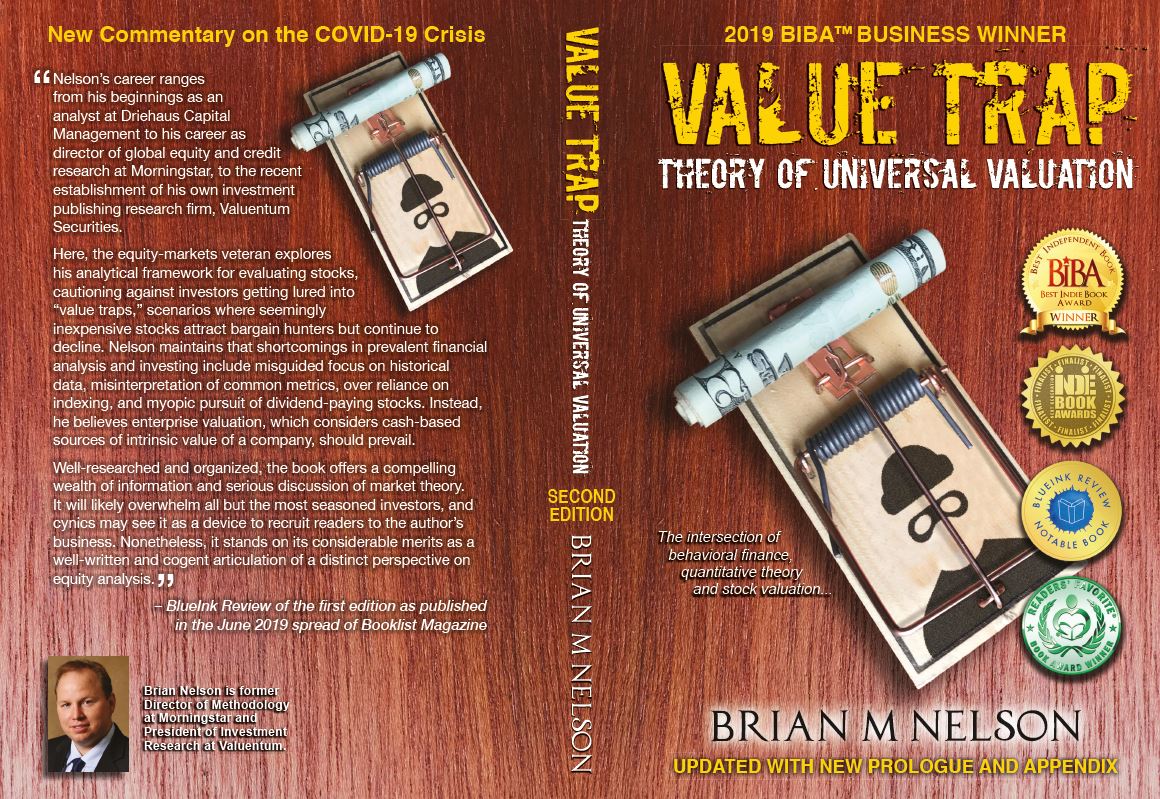Dear members:
---
For every Amazon (
AMZN) that made it, there are hundreds, maybe thousands, from the dot-com era that didn't. Very few remember Pets.com or etoys.com, both of which went belly up during the dot-com meltdown. For every Tesla (
TSLA), there is a DeLorean Motor Co. We might have completely forgotten about DeLorean were it not for the blockbuster movie,
Back To The Future, that immortalized its futuristic sports car.
---
For every streaming enterprise like Netflix (
NFLX), there is a Napster that failed. Most of us probably don't even remember the original Napster, which encountered legal troubles before closing shop shortly after the dot-com bust. For every Alphabet (
GOOG,
GOOGL), there's an AltaVista or Netscape. For every Apple (
AAPL), there is a Palm or Blackberry (
BB). Who remembers how popular the Palm Pilot and Blackberry were? How about the Motorola (
MSI) Razr? For every Facebook and Instagram (
META), there is a Myspace or Friendster.
---
As investors, we underestimate the role of luck in a company's long-term success. In February 2000, a month before the dot-com market crash, a fledgling Amazon raised $672 million in convertible notes to European investors. If the company hadn't done so, there'd likely be no Amazon today, and one of the wealthiest men in the world, Jeff Bezos, might have just been a mere footnote in stock market history. Amazon would have been insolvent in 2001-2002 just like many of its other dot-com peers.
---
Tesla might not have cut it decades ago. Many baby boomers preferred their gas-guzzling muscle cars and big SUVs. If crude oil prices hadn't soared during the energy resource bubble during the 2000s (sparking memories of the Oil Embargo of 1973), there might not be as much appetite for electric vehicles as there is today (putting aside, of course, the environment-conscious reasons). After all, the first electric vehicle was invented in the early 19th century, and an electric carriage was a big hit at the 1893 Chicago World's Fair.
---
What if Netflix had stuck to snail mail with its DVD delivery service, instead of innovating into streaming? Another company would have certainly eaten its lunch, and it may have lived up to what many pessimistic analysts were expecting in its early years. In 2004, for example, some analysts pegged the company's fair value at just $8 per share. Netflix is now a far different company than it was years ago, even creating its own movies. The company is trading at nearly $340 per share, after a 7:1 stock split in 2015.
---
Google's search algorithm has changed the world, but at one point we had AltaVista and Netscape and even Yahoo. We didn't know that we needed Google when we had Yahoo, just like people didn't know they preferred an automobile even though they had a great stable of horses. Will artificial intelligence and ChatGPT change the game again? Maybe each of us will have our very own personal chatbot in the future?
---
Myspace and Friendster controlled the social media game years ago, but they just couldn't keep up with Facebook's technological innovation. Now, TikTok is making inroads with its short-form video, even as Facebook fires back with Reels. We sometimes forget that Yahoo had a chance to buy both Google and Facebook, the former on two occasions (the first time for just $1 million) and the latter for $1 billion or so in 2006. Alphabet's market cap is now north of $1 trillion, while Facebook's is now nearly $800 billion.
---
Everybody loved their Blackberry in 2010-2011, but when Apple's clickwheel technology became mainstream, there was no going back. Any one of the smartphone makers could have been the "Apple" of today, however. Apple didn't have to be the winner. After all, the company lost the PC game in the 1990s, as Compaq, Dell (
DELL) and IBM (
IBM) reigned supreme. Things could have gone a far different way for Apple.
---
How many of us have heard the story of someone who bought and held Amazon from the dot-com bubble, or that got in on Tesla "early," or that continued to add to Netflix during the large drawdowns of the past decade. How many have owned shares of Apple from the mid-1990s? You probably don't hear stories of people that lost it all in Pets.com or etoys.com, or find many books written about investors that went all-in on electric vehicle technology in the late 19th century, even though it was the way of the future.
---
Luck plays a big role in which companies excel and which companies fail. If things had gone only slightly differently, the companies that we think of as huge successes today might not even be in existence. Even studying economic moats isn't a foolproof strategy of protecting your portfolio from uncertainty. Warren Buffett's recent forays into IBM, the airlines (
JETS), and Kraft Heinz (
KHC) are subtle reminders that even the best of the best can't always anticipate what the future holds. That's why we pay close attention to the Economic Castle rating, which considers the ROIC-WACC spread over the foreseeable next five years, not into perpetuity.
---
But as investors, we cannot fall into the trap of ignoring the future either, and we certainly cannot fool ourselves into believing we know what will happen 10 to 20 years from now. We simply don't. What if Myspace gained a technological edge against Facebook? What if Amazon didn't get its funding in February 2000? What if Netflix stood still and failed to innovate? What if Yahoo had actually bought Google or Facebook for a fraction of what they are worth today (and not Mark Cuban's now-defunct Broadcast.com)? What would the FAANGs look like today if things had gone just a bit differently? Who would own the Mavericks?
---
So, if luck is so predominant in outcomes, how should we approach the role of luck in investing? For starters, we can't be too confident in what we think the future might hold (that's obvious), even for moaty companies (i.e. what a company's fundamentals in the next 10 to 20 years will look like). Think again about all the moaty restaurants, REITs (
VNQ) and airlines that have suffered immensely during the COVID-19 pandemic. Likewise, we also know that we need to consider future forecasts, as past data only provides some vague context and isn't the slightest bit useful when it comes to asset pricing (save for a company's existing net cash balance on the books).
---
But this is okay. For long-term investors, what actually happens to future fundamentals may not be the most important consideration. You read that correctly. What drives stock values and prices today (and at every point in the time in the future) is what people think will happen to fundamentals (i.e. free cash flow) in the future (and in each iteration of a "new" future as time passes and expectations change). Investing is not about predicting future reality, but rather about reading expectations, and anticipating expectations revisions.
---
Therefore, it becomes crucial to know how future expectations impact the valuation construct. Let's walk through an example. During March and April of 2020, when the Fed and Treasury provided a backstop to the markets, many continued to focus on the uncertainty of the present economic conditions. Nobody truly knew what the economic data in the next two quarters would look like. But the more important consideration was that the long-term component within equity valuation was being enhanced as interest rates fell and inflationary expectations increased.
---
Investors didn't need to know what the economic data would look like in the second quarter of that year or even for all of 2020--or all of 2021--to know that stock values were advancing within the enterprise valuation construct as a result of Fed/Treasury actions and changes in long-run expectations. Here's the takeaway: You don't need to know future fundamentals (i.e. free cash flow) with precision to be successful in the markets. Don't fear forecasts and the role of luck. You do, however, need to know how future expectations (and changes in future expectations) impact stock values and prices.
---
That's why the construct of enterprise valuation, or the discounted cash-flow model, is so important. Enterprise valuation is so much more than the tool to arrive at a fair value estimate. It is necessary to understand the stock market, itself. As I write in the book
Value Trap, the process of enterprise valuation helps to inform the investor of the key drivers behind stock market movements (e.g. net cash on the balance sheet and future expected free cash flow) and how one can assess pricing movements (and returns) via changes in future expectations.
----
Today, we're in a new bull market. Artificial intelligence is booming. Inflation appears tamed based on recent CPI and PCE measures. Unemployment is still near all-time lows. The residential housing market is holding up. The stock market remains resilient supporting household wealth. The Fed has raised rates considerably, translating into tremendous future dry powder to stimulate equities. The banking system was challenged yet again with SVB Financial and showed that government agencies were ready to act and in a big way to keep the financial system sound. The regular goings-on and tit-for-tat with China, North Korea and Russia continue, but that's nothing out of the ordinary (
source).
--
These are great times, and market participants continue to build in new, stronger expected forecasts of free cash flow, especially within the areas of big cap tech and large cap growth. Stocks such as Apple, Alphabet, and Microsoft (
MSFT) are powering the market higher thanks in part to their strong net cash positions on the balance sheet and upwardly-revised future expected free cash flows stimulated in part by spending related to artificial intelligen
ce. Luck will play a big role in which companies will win in artificial intelligence in the long run (much like which companies won in autos, mobile phones, and social media, etc), but the discounted cash-flow model construct (enterprise valuation) helps to explain so much in the markets that it's simply hard to ignore. Don't dis the DCF.
-----
I hope you found this article helpful!
---


0 Comments Posted Leave a comment